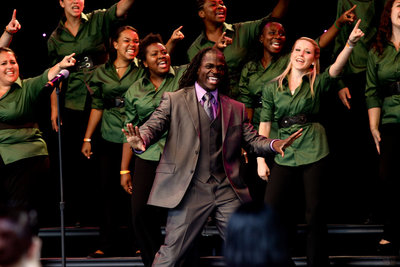
The Jan. 16 Eugene Symphony concert at the Hult Center opens with some of the 20th century’s most powerfully dramatic music: the “Four Sea Interludes” from Benjamin Britten’s mighty opera Peter Grimes. This performance of one of the greatest English composers’ most popular concert works misses by just a few days cashing in on Britten’s centenary celebrations, but we don’t need no stinkin’ birthday excuse to enjoy his music. No voices in that one, of course, but the operatic theme continues in one of the next works on the program, the famously virtuosic “Queen of the Night” aria from Mozart’s The Magic Flute, featuring singer Mary Wilson — no, not The Supremes vocalist, but instead a rising young opera diva. She’ll also perform another of Mozart’s most popular vocal showcases, the joyous motet “Exultate, Jubilate,” which the 16-year-old composer dashed off while simultaneously writing another opera, and another poignant aria, “Let Me Explain, Oh God,” which Mozart wrote for another composer’s opera, not uncommon in 18th-century Vienna. The concert concludes with a much-performed chestnut, Brahms’s Symphony No. 3.
Speaking of powerful vocals and birthday celebrations, the UO Gospel Choirs and Ensembles sing spirituals that celebrate the life of a real hero, Martin Luther King, Jr., on Monday afternoon, Jan. 20, at Beall Hall. That night at Beall, trombone titan Joseph Alessi, principal at the New York Philharmonic who’s appeared on dozens of recordings, opens his weeklong UO residency with a solo recital, continues with a concert with the UO trombone ensemble on Jan. 22 and concludes at Jan. 24’s University Symphony concert by showcasing his instrument in passages from Shostakovich’s Symphony No. 5, Berlioz’s Fantastic Symphony and film score legend Nino Rota’s Trombone Concerto.
The following night, Baroque music fans get their first thrill of the new year in a highly recommended Jan. 25 concert at Central Lutheran Church, 18th & Potter, featuring two of Portland’s most valuable musical players: The Ensemble (a small vocal group creamed from the top of the city’s superb large choirs) and Musica Maestrale, which has been enriching the city’s early music scene with small-ensemble performances of music from across the Baroque era. They’re performing the music of the first great Baroque composer, Claudio Monteverdi, including solos, duets and theater music, along with one of the most heart-rending of all madrigals, the plangent Tears of a Lover in the Sepulchre of his Beloved.
There’s vocal vibrancy on the jazz side, too, at the Jan. 18 concert at The Shedd, featuring the rising young chanteuse Halie Loren, who’s been winning national attention after making her name in Oregon. She joins saxman, KLCC DJ and jazz scholar Carl Woideck’s Jazz Heritage Project in the music of maybe the greatest of all the American songbook legends, Harold Arlen, the cantor’s son whose list of classics merely includes immortals like “Stormy Weather,” “It’s Only a Paper Moon,” “One for My Baby,” “Blues in the Night,” “The Man that Got Away,” “That Old Black Magic,” “Come Rain or Come Shine” and many, many others, plus, of course, that colorful little number from The Wizard of Oz.
Eugene’s own jazz sax master Joe Manis covers some American songbook standards, though none by Arlen, on his splendid 2013 album, North by Northwest. This Saturday, he’s performing with peripatetic Portland jazz drummer Jason Palmer and one of Oregon’s newest and most valuable jazzers, pianist George Colligan, who arrived last year from New York to take a teaching job at Portland State University and has been lighting up the PDX jazz scene ever since; his just-released CD scored high praise in The New York Times. It’s a pity that Manis’s trio plays The Jazz Station on the same night as Woideck and Loren are performing at the nearby Shedd … but since Manis’s show runs till 11 pm, you might be able to catch a good portion of the latter if you zoom after the former. It’d be worth the scramble.